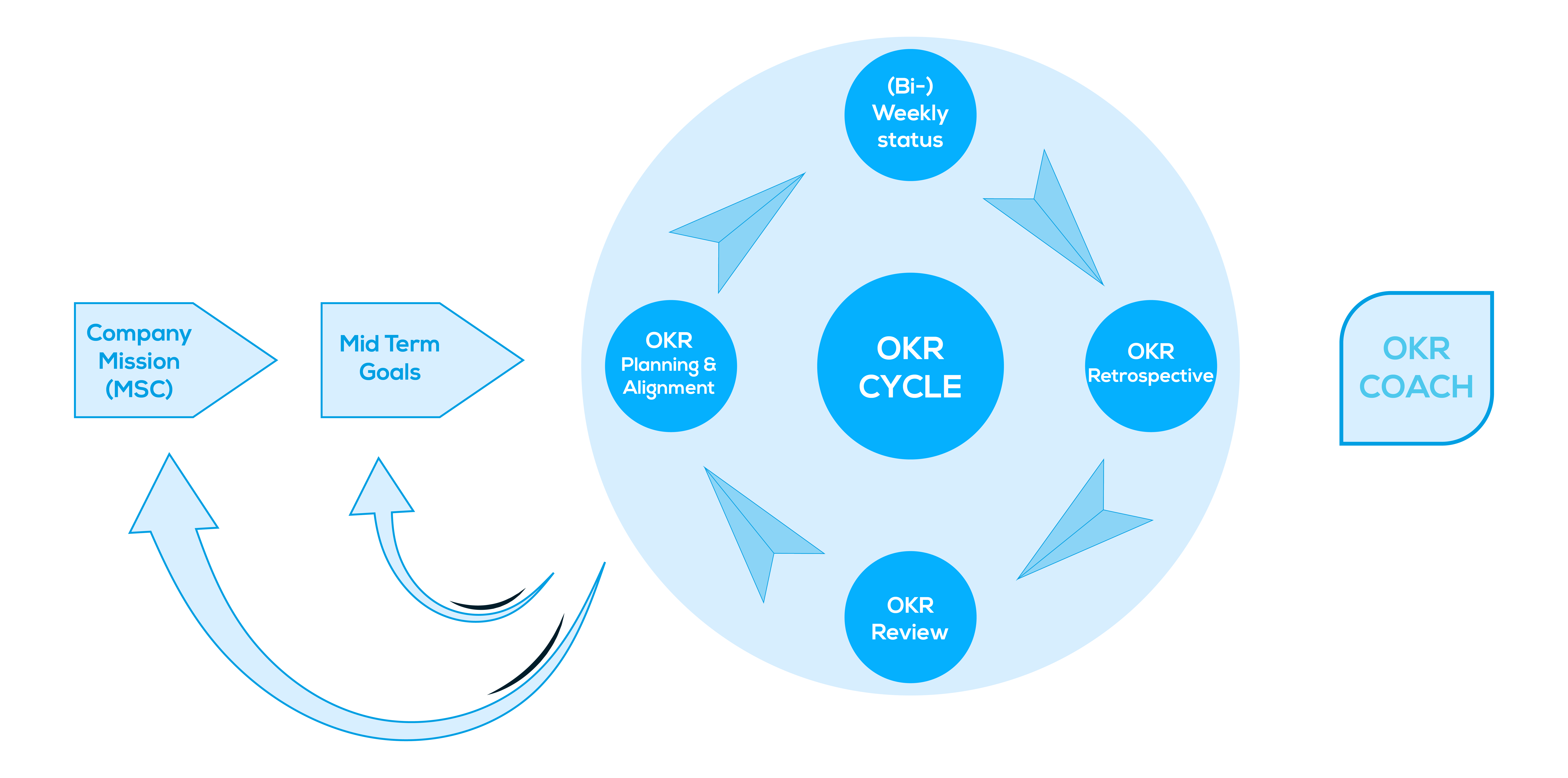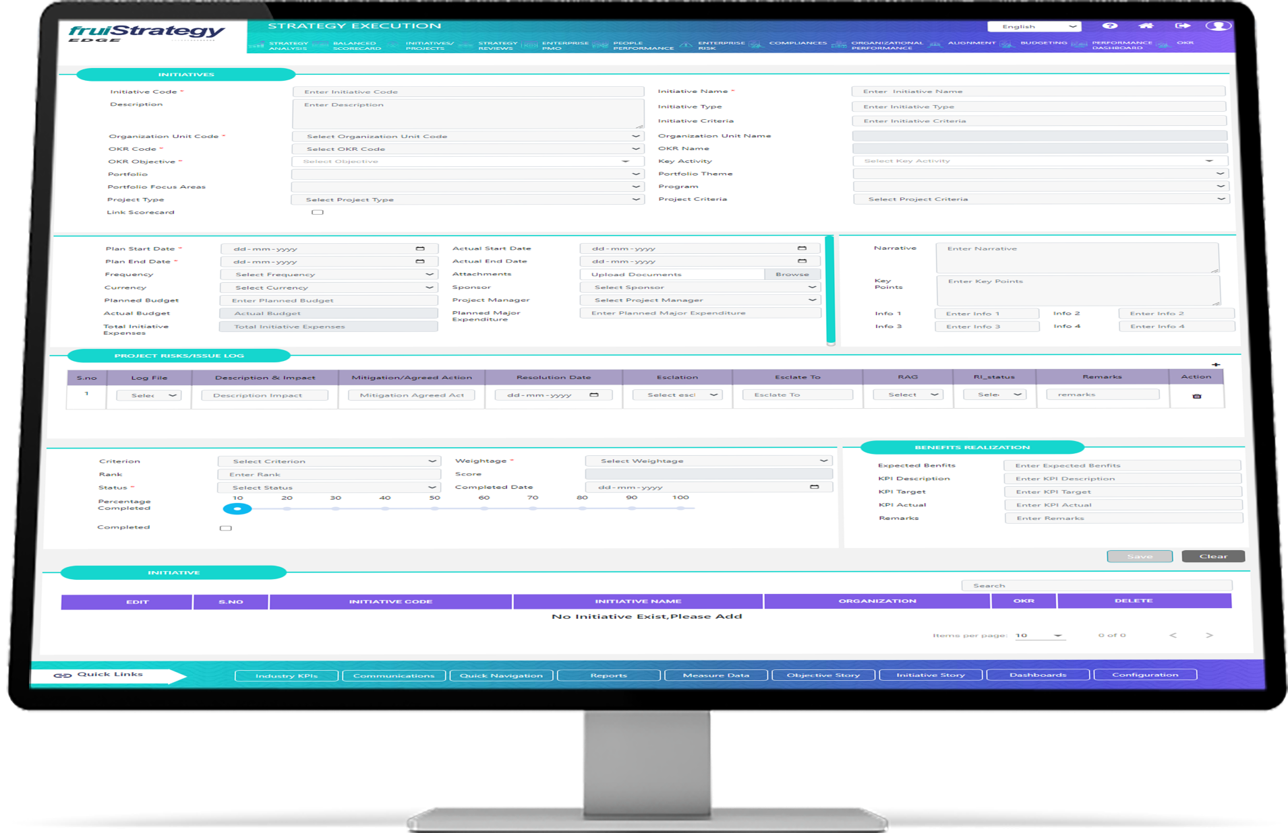Clarity
OKR bring the clarity for goal setting and help organizations to fix the priority. The methodology is driven by metrics and brings success for strategy transformation.


OKR stands for Objectives and Key Results in fruiStrategy®. It is a cooperative goal-setting process for organisations, teams, and people. During his time at Intel, Andrew Grove helped to popularise the OKR concept. In 2017, John Doerr wrote a book titled Measure What Matters about the OKR framework, formalised the approach, successfully aided companies like Google, and made it a formal procedure. John Doerr explains Grove's straightforward yet powerful idea in his book. This method of strategy implementation was employed by many firms, and it produced ground-breaking outcomes.
Objective is what we want to achieve in future. This sets a direction and destination and it should be very clear and easily understood. Key Result is a measurable outcome required to achieve the objective. It contains a measure and metric with a target value. Key Results tell you how close you are to achieve an objective. Initiative is performed to achieve a Key Result.
fruiStrategy® OKR is a comprehensive tool to automate strategy transformation through OKR methodology. The organizational goals, Objectives, Key Results, initiatives, OKR performance reporting, OKR reviews, initiative reviews, overall organizational performance can be automated through fruiStrategy® OKR.
Tasks are single units of work that are completed by predetermined dates and must advance the goals of the project as a whole. A task can be further divided into subtasks, each of which should have a clear start and end date for completion, much like project management is the coordination of individual tasks. Get objective performance by executing the projects on time, within budget, and according to the scope. The end-to-end project management processes are managed with the aid of fruiStrategy.
• OKR methodology should be launched with proper understanding of the methodology and organizational readiness.
• The owner of the program should be a top leader in the organization and the Ambassador of the program.
• The vital part is to define the Objectives which are connected and drive the results for the organization. This is a clear business understanding and how the value is delivered by the objectives.
• Once we define the Objectives, the owner should be identified for each objective and the team responsible for delivering it.
• Key Results are to be identified for each Objective which could range from 3 to 5 depending on the type of Objective.
• Key Results should be very clearly measurable and we should know how to report the measure data correctly without any ambiguity.
• The target and actual gap of Key Result numbers should be assessed and Initiative/ Projects need to be defined which has clear start and end dates with a budget and a project manager assigned.
• The Initiatives close the gap of Key Results and which in turn ensure the achievement of Objectives.
• The Ultimate Goal is very important. All the Objectives should be directed towards the Goal of the Organization.
• The time period of OKR is usually 1 to 3 years. The Objectives should be created with clear outcomes expected usually 3 to 4 achievements in 12 months.
• We need to have the Team OKRs and Individual OKRs cascaded down so that team and individuals know what they have to do to achieve a particular Objective to realize the strategy.


OKR bring the clarity for goal setting and help organizations to fix the priority. The methodology is driven by metrics and brings success for strategy transformation.
OKR process sets the key organizational goals to achieve strategic results and capabilities. The stretch goals help the individuals and team to achieve breakthrough results.
Use user-friendly online and mobile applications created for active and dispersed fleets to handle any task related to a fleet or surface crucial data whenever and wherever you need to.
The organizational goals are cascaded to well defined objectives and hence the complete organizational alignment is derived with proper OKR definition.
As the whole organization experiences the critical OKR implementation, the performance culture is instilled and key results make it sustainable.
OKR makes the strategic transformation in executable components and makes it simple with clear focus and the whole organization is aligned.
The data-driven nature of OKRs enables to make informed decisions about the direction of a company. This data can be used to identify areas of improvement and to set new goals.
By setting goals and objectives and tracking progress, OKRs can help to ensure that resources and funds are allocated properly and effectively.
Industry Standards
Industry Standards
Industry Standards
Consulting for all steps in strategy execution which include strategy planning, strategy translation, strategy reviews, PMO processes, risk management, strategy refresh, personal scorecards and others.
Implementation of strategy execution process aligning with all best practices which include Execution Premium, OKR, Enterprise PMO, Enterprise Risk Management, Personal Scorecards, and Strategy Analysis tools.
Integration with all complementing solutions and data sources to have seamless flow of data to make data available on time to enable better decision making.
Software solution which is comprehensive, easy to implement, easy to maintain empowered by latest technologies which include AI/ML, process mining, mobility, API enabled.

© 2023 - Data Labs America all rights reserved.
